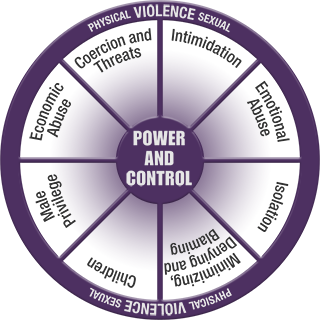- Who are the victims of domestic violence?
- According to the U.S. Department of Justice, 85% of all domestic violence victims are women. Every nine seconds, men stalk, beat and terrify women they claim to love. Victims of domestic violence cross every imaginable boundary, including age, race, religion, socioeconomic class, and sexual orientation. Although recent reports indicate that nearly 28% of all marriages and intimate relationships involve some form of domestic violence at one time or another, most incidences go unreported.
- Are men victims of domestic violence?
- Yes, although it's difficult to quantify just how many men are victims of abuse every year given their tendency not to report domestic incidences.
- Who are the abusers?
- Just like victims, abusers and batterers fall into every category. They can be unemployed or working professionals. They can be gregarious and charismatic or quiet and introverted. Regardless, experts agree that most abusers grew up in abusive households witnessing violence, or were victims as children themselves who unwittingly continue the cycle of domestic violence as adults.
- Why do victims stay with their abusers?
- This isn't an easy question to answer because domination, threats and intimidation are powerful weapons in an abuser's arsenal. Most victims genuinely believe their abuser has both the capacity and the will to change. Therefore, when he apologizes and promises to never hurt her again, the victim believes him. For some, this may be true as the abusive relationship suddenly returns into what's called the honeymoon phase. But as the Power and Control Wheel illustrates below, the honeymoon phase is a temporary respite. One innocuous word or act will soon set the Wheel back into motion and the cycle of abuse will begin again.

- Other victims believe they have no support system if they decide to leave their abuser. They may be embarrassed or too ashamed to admit they are a battered woman. Many believe they will lose everything they've worked for in the marriage – even their children – should they leave. And still others are convinced that the abuse is actually their fault and if they work hard enough to please their partner, the abuse will stop.
- What should I do if I suspect someone is being abused?
- First, empower yourself with knowledge about domestic violence and the resources that are available to the victim, such as DaySpring Villa. Remember, the last thing a victim needs is another confrontation. Instead, draw her aside at a safe place and time, and tell her that you're sincerely concerned about her. Reaffirm to her that the abuse is not her fault and that free help is available to her and her children, if any. Open lines of communication with her but don't push as she's probably not ready to share details. Nevertheless, reassure her that she's not alone. Stay in contact and speak with her regularly about positive options that are ready for her when she's ready for them. Devise a code word or simple phrase that she can share with you in case she needs an emergency exit. Finally, be patient. It may take some time before she can muster the courage to leave her abuser.

To learn more about what you can do if you suspect someone is being abused, refer to our safety plan or call DaySpring Villa at 918.245.4075.
